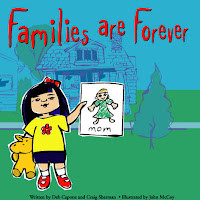ADDITIONAL RESOURCES
1.
Child Welfare Information Gateway: Retreived December 2, 2010 from http://www.childwelfare.gov/
Child Welfare Information Gateway promotes the safety, permanency, and well-being of children, youth, and families by connecting child welfare, adoption, and related professionals as well as the general public to information, resources, and tools covering topics on child welfare, child abuse and neglect, out-of-home care, adoption, and more.
http://www.childwelfare.gov/aboutus.cfm
2. Child Nutrition and Health: Family Resources. Retreived from
http://www.fnic.nal.usda.gov/nal_display/index.php?.....4
Articles of interest:
- Let's Move: The White House; Department of Health and Human Services; U.S. Department of Agriculture; Department of Education.
A nationwide campaign to tackle the challenge of childhood obesity by providing schools, parents, and communities with tools to help kids be active, eat better, and get healthy. http://www.letsmove.com/
- M.O. M. - Mothers & Others & My Prymaid. USDA. Center for Nutrition Policy and Promotion.
Project M.O.M. aims to empower the nutritional gatekeepers with the skills and information they need to model a healthy lifestyle and make "family-healthy" food choices. http://www.mypyramid.gov/projectmom/index.html
- Feeding Infants and Toddlers : American Dietetic Association.Provides guidance for parents on choosing appropriate amounts and types of foods to feed their toddlers. http://eatright.com/
3. Zero to Three Coming Together around Military Families: Retreived December 2, 2010 from http://www.zerotothree.org/
ZERO TO THREE is proud to support military families. "We work to increase awareness and collaboration throughout the military community so that parents and professionals can more effectively care for very young children and their families." http://www.zerotothree.com/
4. Association for Childhood Education International (ACEI). Retreived December 2, 2010 from http://acei.org/
ACEI is a global community of educators and advocates who unite knowledge, experience, and perspectives in order to exchange information, explore innovation and advocate for children.
ACEI acts as a knowledge broker, sharing innovative ideas and practices from a diverse community of individuals and institutions.
ACEI members take action as advocates for social change and education reform to uphold the child’s right to achieve his or her full human potential.
STATEMENT OF COMMITMENT
- To promote the inherent rights, education, and well-being of all children in their home, school and community.
- To work for desirable conditions, programs, and practices for children from infancy through early adolescence.
- To bring into active cooperation all individuals and groups concerned with children.
- To raise the standard of preparation for those actively involved with the care and development of children.
- To encourage continuous professional growth of educators.
- To focus the public’s attention on the rights and needs of children, and on the ways various programs must be adjusted to fit those rights and needs.Universality
We believe that there are key principles that join our world together through the common bonds of human dignity and respect. All those concerned with the education of children should uphold these universal principles.
BELIEFS
ACEI delivers its humanitarian mission based on a platform of four core beliefs.
UniquenessWe believe each child possesses a unique set of gifts and talents. Educators and others invested in the education of children should value each child as a unique and special individual.
Universality
We believe that there are key principles that join our world together through the common bonds of human dignity and respect
Quality
We believe that educational experiences are enhanced by instructional strategies and learning environments that offer the very best opportunities for children’s learning within the context of the nation, community, city, town or village in which children live.
Equality
We believe all children should be educated in environments of fairness where there is freedom from bias or favoritism and where access to, and participation in, educational experiences are the cornerstone of the home, school and community.
I have an interest in the ACEI because they are an international organization representing children from all over the world - Children of different races, and culture.
Bright Future For Every Child, Every Nation!







